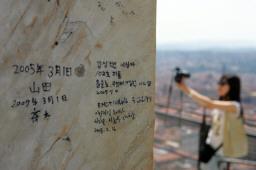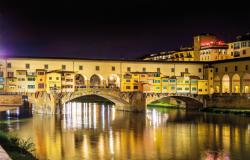Japan's two largest newspapers on Monday apologised to Italy on behalf of Japanese tourists who have been scrawling their names on the walls of Florence's famed 15th-century Duomo during trips to Europe.
The apologies in the Yomiuri and Asahi papers came after a flurry of media attention on the recent tourist trend, which has seen a number of culprits forced to step forward after anonymous tip-offs.
On Monday a 30-year-old Japanese high school teacher's job hung in the balance after an anonymous message to his school revealed he had written his name and date on the marble wall of the Duomo's panoramic terrace during his honeymoon in January last year.
''I did it without thinking much after hearing that writing your name on that stone brought happiness,'' the teacher said.
The school's headmaster apologised for the teacher's ''inconsiderate behaviour'' and said he had already been dismissed as school baseball coach as a result of the incident.
Another anonymous tip-off led to three Kyoto university students being suspended after writing their names, the date, and the name of the university on the Duomo earlier this year.
The university said it was considering sending the culprits back to Florence to clean off the graffiti.
A high school student was also unmasked as being among tourist vandals but was let off with a caution from her school.
During a special programme broadcast by national Japanese television station Tvs6, Tokyo-based Tuscan chef Pietro Androsoni described the phenomenon of writing on Brunelleschi's famous dome as ''incredible''.
''I can't believe that this can be happening when the Japanese are known for their correctness,'' Androsoni said.
''It's like if someone wrote on (Kyoto's UNESCO-pegged golden pavilion) Kinkaku,'' he added.
Florence city council's security chief Graziano Cioni described the trend for writing on the landmark as ''shameful''.
''But I like the fact that there's been a mass uprising in Japan against tourists who carry out these acts,'' he said.
Cioni added that he did not think ''posting a policeman at every crossroad'' was the answer to the problem
''It's a question of culture. I hope that everyone will police themselves - and others - so that we can bring back decorum to the city,'' he added.
Italy spends hundreds of thousands of euros every year cleaning up historical monuments that have been defaced by writing or graffiti art.





